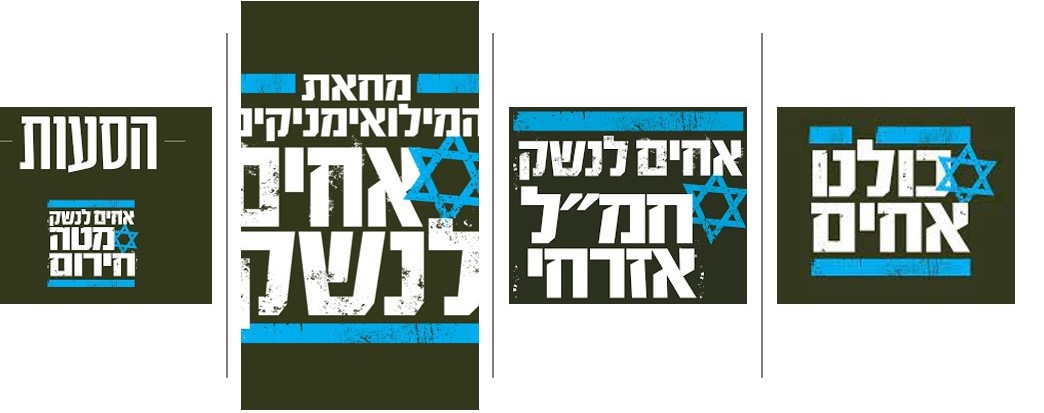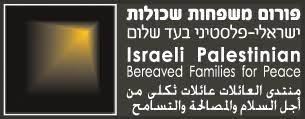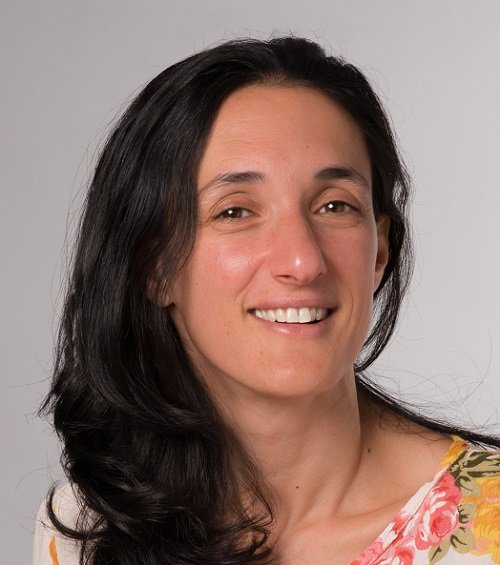
Op-ed
It’s Biblical! The Meaning Is Less Relevant
Contemporary Israeli discourse uses the Bible’s rhetorical power to sway public opinion, sometimes interpreting phrases to suggest the opposite of what they meant in their original context.
Israel judicial reform slogans and Jerusalem’s Old City / Wikimedia (adapted).
Brotherhood is a pervasive metaphor in modern Israel. Three biblical passages from Genesis used in the public discourse illustrate this idea.
שׁוֹמֵר אַחִי “My Brother’s Keeper”
After Cain murders his brother Abel in a fit of jealousy, God asks Cain where Abel is, perhaps hoping that Cain will express contrition. Instead, after YHWH asks Cain where his brother is, Cain pretends he doesn’t know:
בראשית ד:ט ...וַיֹּאמֶר לֹא יָדַעְתִּי הֲשֹׁמֵר אָחִי אָנֹכִי.
Gen 4:9 …And he said, “I do not know. Am I my brother’s keeper?”
This evasion of responsibility leads God to rebuke Cain and to punish him with lifelong wandering.
In contemporary Israeli discourse, the phrase שׁוֹמֵר אַחִי, “My Brother’s Keeper,” is recast to suggest that unlike Cain, one can and should be their brother’s (or brothers’) keepers. For example, the NGO Shomer Achi provides social and psychological services to ex-combatants with PTSD, i.e., functioning as the keepers of their brothers. Furthermore, the name of the organization in English is “Guardian Brother,” possibly referring to soldiers who served in the military for the sake of their brothers.
Another group that uses this phrase is השומר החדש, HaShomer HaChadash, an organization dedicated to safeguarding Jewish public land through agricultural and educational initiatives. They utilize the phrase “My Brother’s Keeper” to express their commitment to protecting Jewish-Israeli farmers.
 Left: “Guardian Brother” NGO; Right: Participants of the HaShomer HaChadash, with "Shomer Achi" shirts
Left: “Guardian Brother” NGO; Right: Participants of the HaShomer HaChadash, with "Shomer Achi" shirts
In both cases, the phrase “my brother’s keeper” is meant to undo Cain’s cynical usage. Unlike Cain, who did not think of himself as his brother’s keeper, the organizations endeavor to manifest care and commitment towards their brothers, by means of protecting their land, or by assisting former combatants to recover from trauma after serving to protect the collective family.
The non-biblical use of the well-known phrase in the Cain and Abel story is intentional: it assumes that audiences are aware of and appreciative of the repurposing.
אֶת אַחַי אָנֹכִי מְבַקֵּשׁ “I am looking for my brothers”
When Joseph is sent by his father to see how his brothers are doing, Joseph first heads to Shechem, where he last heard they were grazing their flocks, but they are not there. A man—interpreted by the Sages (Gen. Rab. 84:14) as an angel—asks Joseph who he is looking for, and Joseph replies:
בראשית לז:טז וַיֹּאמֶר אֶת אַחַי אָנֹכִי מְבַקֵּשׁ הַגִּידָה נָּא לִי אֵיפֹה הֵם רֹעִים.
Gen 37:16 He answered, “I am looking for my brothers. Could you tell me where they are pasturing?”
The phrase “I am looking for my brothers” was used in modern Jewish circles in the campaign to allow Jews to emigrate from the Soviet Union (1963–1991). It has since been employed for other “brotherly” causes, such as bringing Ethiopian Jews to Israel or strengthening Holocaust awareness.
Most recently, the phrase has been used as part of the campaign to free the hostages taken by Hamas and other terrorist organizations from Israel on October 7, 2023. Emphasizing the close connection between Israelis, it expresses people’s commitment to free their brothers from capture and bondage.
 Top left: Ethiopian Jewry; Top right: Freeing hostages; Bottom left: a rabbinic letter calling for unity in light of the judicial protest; Bottom right: Holocaust awareness
Top left: Ethiopian Jewry; Top right: Freeing hostages; Bottom left: a rabbinic letter calling for unity in light of the judicial protest; Bottom right: Holocaust awareness
But the modern usage of the phrase differs from the one in the Bible. In the biblical narrative, Joseph is actively looking for his brothers against the backdrop of a family rift. However, his quest to find his brothers is ironic, given the brothers’ hatred and vengeful intentions towards him. Joseph’s inability to find his brothers in Shechem foreshadows their immanent violence against him.
The biblical quote is ominous: when Joseph eventually catches up with his brothers, they throw him in a pit and later sell him to an Egyptian master as a slave. But those using the quote as a slogan to free Jews, whether from the USSR last century or the hostages from Gaza in 2023/4, are using it in a highly charged positive sense. The Bible’s rhetorical force buttresses the power of the demand for commitment to the cause.
כִּי אֲנָשִׁים אַחִים אֲנָחְנוּ “For We Are Brothers”
Living side by side in Canaan, the shepherds of Abram and those of his nephew Lot fight over limited grazing resources. To end the conflict, Abram suggests that instead of fighting, they should separate:
בראשית יג:ח וַיֹּאמֶר אַבְרָם אֶל לוֹט אַל נָא תְהִי מְרִיבָה בֵּינִי וּבֵינֶיךָ וּבֵין רֹעַי וּבֵין רֹעֶיךָ כִּי אֲנָשִׁים אַחִים אֲנָחְנוּ. יג:ט הֲלֹא כָל הָאָרֶץ לְפָנֶיךָ הִפָּרֶד נָא מֵעָלָי אִם הַשְּׂמֹאל וְאֵימִנָה וְאִם הַיָּמִין וְאַשְׂמְאִילָה.
Gen 13:8 Abram said to Lot, “Let there be no strife between you and me, between my herdsmen and yours, for we are brothers (or “kinsmen”). 13:9 Is not the whole land before you? Let us separate: if you go north, I will go south; and if you go south, I will go north.”
The phrase, ki anashim achim anachnu, “for we are brothers,” was predominantly used in the discussion surrounding the conflict regarding the judicial reform in Israel in 2023. Mostly employed by the supporters of the reform, the phrase was used to argue that the protests must stop. But the phrase was also heard by people who oppose the reform, to imply that the reform is tearing the country apart.

 Top left: pendant with phrase; Top middle and right: posters pushing for unity despite the judicial reform; Bottom left: MK Avi Maoz (Noam party), using the phrase in opposition to the protest; Bottom right: Pres. Isaac Herzog speaking to all sides about unity.
Top left: pendant with phrase; Top middle and right: posters pushing for unity despite the judicial reform; Bottom left: MK Avi Maoz (Noam party), using the phrase in opposition to the protest; Bottom right: Pres. Isaac Herzog speaking to all sides about unity.
Both of these usages reversed the biblical context: the brotherhood of Abram and Lot is a reason for them to separate, not to unite.
The Power of Family Language
Family language is powerful. We see it elsewhere in Israeli discourse, also outside the biblical language. For example, it is common among Israeli teenage boys and young men to use the word “brother,” אחי, as a term of endearment and commitment, when approaching close friends, but also total strangers.
אחים לנשק “Brothers In Arms”
As part of the protest against the judicial reform in Israel, reserve army soldiers founded the volunteer organization “Brothers in Arms,” אחים לנשק (Achim La-Neshek). The organization sign writes its name in white, next to a blue Star of David, evoking the imagery of the Israeli flag.
 Achim La-Neshek’s posters
Achim La-Neshek’s posters
This slogan is a Hebrew adaptation of a phrase dating back at least to the Renaissance period, describing soldiers who fight together.[1] In the current Israeli context, the expression has a dual meaning: the founders were once brothers-in-arms, i.e. soldiers who served in the Israeli army; now they stand as brothers-in-arms as civilians, engaging in non-violent protests against what they perceive as a threat no less intimidating than a military one.
Israel as a “Bereaved Family”
Another familial expression that is unfortunately quite common of late is משפחת השכול (mishpachat hashakul) “the family of the bereaved.” When applied to humans in the Bible,[2] the root ש.כ.ל refers to a parent who has lost a child. When Jacob fears that the brothers will endanger Benjamin by taking him to Egypt, he responds:
בראשית מב:לו ...אֹתִי שִׁכַּלְתֶּם יוֹסֵף אֵינֶנּוּ וְשִׁמְעוֹן אֵינֶנּוּ וְאֶת בִּנְיָמִן תִּקָּחוּ עָלַי הָיוּ כֻלָּנָה.
Gen 42:36 … “You have made me bereaved: Joseph is no more and Simeon is no more, and now you would take away Benjamin. They are all upon me!”
Similarly, when Samuel is about to execute the king of Amalek, he says:
שמואל א טו:לג ...כַּאֲשֶׁר שִׁכְּלָה נָשִׁים חַרְבֶּךָ כֵּן תִּשְׁכַּל מִנָּשִׁים אִמֶּךָ...
1 Sam 15:33 …“As your sword has bereaved women, so shall your mother be bereaved among women.”…
A related term from this root is used to refer to Zion as a mother, who suffers bereavement in the destruction of Jerusalem, and is being promised new offspring:
ישעיה מט:כ עוֹד יֹאמְרוּ בְאָזְנַיִךְ בְּנֵי שִׁכֻּלָיִךְ צַר לִי הַמָּקוֹם גְּשָׁה לִּי וְאֵשֵׁבָה.
Isa 49:20 The children born in the time of your bereavement will yet say in your hearing: “The place is too crowded for me; make room for me to settle.”
In contemporary usage, however, the term refers to all bereaved family members, not only parents. The phrase is even sometimes used to refer to those outside the extended family, namely to Israelis in general, who are “one big family.”
 Top: “We are all the family of the bereaved”; Bottom: “We envelop the family of the bereaved”
Top: “We are all the family of the bereaved”; Bottom: “We envelop the family of the bereaved”
In this usage, any Israeli lost in the war enlarges the bereaved family.
The Israeli and Palestinian organization פורום המשפחות השכולות, “The Forum of Bereaved Families”—also known as “Israeli Palestinian Bereaved Families for Reconciliation and Peace”—use this term as well. The forum aims to reconnect bereavement with the intimate sadness experienced by the biological families, parents, siblings, and children, highlighting the losses suffered on both sides of the conflict. Through this transcendence of national identity, the group aspires to bridge the difficult divide between Israelis and Palestinians.
 “The Forum of Bereaved Families” NGO
“The Forum of Bereaved Families” NGO
Inspirational Usage Not an Appeal to Authority
The persistent use of biblical phrases to support the metaphor of Israelis as a family illustrates the continuing power of the Bible in popular culture and discourse. The flavor and tenor of biblical questions, and the imagery these phrases evoke, hold sway over popular imagination. The reuse of such phrases shows the ongoing power of the Bible in Israel, as a touchstone, even as it is radically reinterpreted.
TheTorah.com is a 501(c)(3) nonprofit organization.
We rely on the support of readers like you. Please support us.
Footnotes

Dr. Gili Kugler is a Senior Lecturer of Biblical Studies in the University of Haifa. Until recently she was a lecturer in Biblical Studies and Classical Hebrew at the University of Sydney. She holds a Ph.D. from the Hebrew University of Jerusalem, and teaches and writes about topics such as chosenness in biblical theology, religion and politics in prophecy, and biblical narratives and mythology in light of modern psychology. She is the author of several articles as well as the book When God Wanted to Destroy the Chosen People: Biblical Traditions and Theology on the Move (De Gruyter, 2019).


